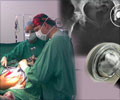Is prehabilitation associated with improved outcomes in patients undergoing orthopedic surgery? Yes, it improved overall function in comparison with usual care.

Prehabilitation for Patients Undergoing Orthopedic Surgery: A Systematic Review and Meta-analysis
Go to source). An estimated 310 million surgical procedures are performed worldwide every year. Musculoskeletal disease is the biggest contributor to global disability. This alongside an aging population has placed an unprecedented demand on surgical services.
‘‘4 to 6 weeks of prehabilitation program including strength training and education is required to induce adaptations for patients undergoing major surgeries.#orthopedics #physical exercise #surgical procedures #back pain’’





Furthermore, undergoing a major surgical intervention can increase catabolism and oxygen demand, leading to a decline in one’s physical function. Waiting for a surgical procedure, therefore, provides a window of opportunity to optimize and influence the predictive factors.Preoperative muscle strength, function, and health-related quality of life (HRQOL) of a patient are often considered predictive factors associated with postoperative outcomes in the population undergoing orthopedic surgery. This is termed prehabilitation (2✔ ✔Trusted Source
Prehabilitation in Preparation for Orthopaedic Surgery
Go to source).
Analyzing the Impact of Prehabilitation on Patients Undergoing Orthopedic Surgery
Although prehabilitation has been reported in the literature since the 1940s, the role of prehabilitation in improving postoperative outcomes has only been researched since the year 2000. Systematic reviews investigating the benefits of prehabilitation have reported varying conclusions.Hence, researchers from Anglia Ruskin University (ARU), Addenbrooke’s - Cambridge University Hospitals NHS Foundation Trust (CUH), and Western University in Ontario, Canada, examined the results of 48 unique clinical trials involving prehabilitation techniques such as exercise, pain management and acupuncture among patients about to undergo orthopedic surgery.
Outcomes were measured before surgery as well as at intervals post-operation. Results were graded for certainty, or confidence that results were true.
Before surgery, the study found strong evidence that prehabilitation led to a reduction in back pain for people waiting for lower back surgery and evidence of moderate certainty for improvement in their health-related quality of life.
Advertisement
Following an operation, the study found that prehabilitation improved function in the short to medium term compared with no prehabilitation.
Advertisement
It’s Time to Find the Best Ways to Prepare Orthopaedic Patients Before Surgery
Furthermore, any prehabilitation program should ideally be delivered for at least four to six weeks before the surgical intervention and twice a week for optimum results (3✔ ✔Trusted SourceEffect of preoperative psychological interventions on elective orthopaedic surgery outcomes: a systematic review and meta-analysis
Go to source). Health services looking at developing such programs could utilize recommendations from this study.
While the results of the study are encouraging and support prehabilitation, it is also important that patients engage in post-operative exercise programs appropriately to achieve optimal outcomes. Outcomes following orthopedic surgical interventions may be variable and this study contributes to understanding the role that muscle strength may play in the variability of surgical outcomes.
The focus of our research group is the optimization of outcomes following surgical intervention in young adults with hip pathology. Two trials to address this question are currently underway at CUH looking at prehabilitation and the role of muscle strength in patients undergoing keyhole surgery of the hip.
References:
- Prehabilitation for Patients Undergoing Orthopedic Surgery:A Systematic Review and Meta-analysis - (https://jamanetwork.com/journals/jamanetworkopen/fullarticle/2803788)
- Prehabilitation in Preparation for Orthopaedic Surgery - (https://journals.lww.com/orthopaedicnursing/Abstract/2002/09000/Prehabilitation_in_Preparation_for_Orthopaedic.8.aspx)
- Effect of preoperative psychological interventions on elective orthopaedic surgery outcomes: a systematic review and meta-analysis - (https://onlinelibrary.wiley.com/doi/abs/10.1111/ans.15332)
Source-Eurekalert









